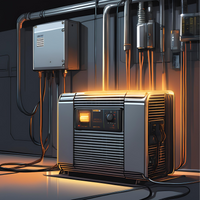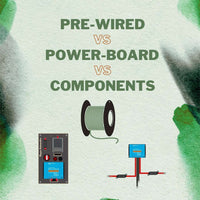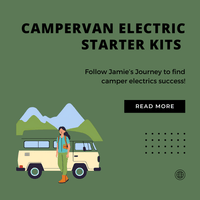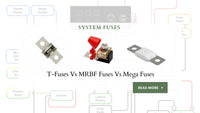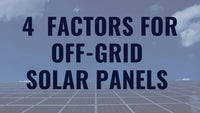Introduction
Welcome to Rayne Automotive's ultimate guide to solar panels for your campervan or motorhome (or other off-grid project)! Whether you're a seasoned van lifer or just starting your first conversion, solar panels can seem daunting. This guide will break down everything you need to know, from choosing the right type of panel to understanding the different types of controllers, all in simple, user-friendly terms.
Why Solar Panels?
Solar panels are a fantastic way to power your campervan or motorhome, providing you with a sustainable, long-term low output power source. They allow you to go off-grid, giving you the freedom to extend your time between mains charges, allowing you explore remote areas.
Types of Solar Panels
When it comes to solar panels for your campervan, you have two main types to choose from: monocrystalline and polycrystalline.
Monocrystalline Panels
- Pros: High efficiency (15-20%), long lifespan, and better performance in low-light conditions.
- Cons: Higher cost.
- Best For: Users who want the most efficient and durable option and are willing to invest more upfront.
Polycrystalline Panels
- Pros: Lower cost, decent efficiency (13-16%).
- Cons: Slightly lower efficiency and shorter lifespan compared to monocrystalline.
- Best For: Super budget-conscious users who still want reliable performance.
Which panel type would I choose?
Generally, we would only use monocrystalline panels, and that's all you'll find in our shop as the cost difference is small and with limited roof space, efficiency is often the most important factor.
Rigid vs. Flexible Solar Panels
Another important consideration is whether to choose rigid or flexible solar panels.
Rigid Panels
- Pros: Durable, more efficient, and cheaper.
- Cons: Heavier and can be more challenging to install due to their inflexibility and the need for either screws or bolts into the roof of the vehicle.
- Best For: Any situation they can be used for, basically where aesthetics or weight don't point towards a low profile flexible panel.
Flexible Panels
- Pros: Lightweight, easy to install, and can be mounted on curved surfaces.
- Cons: Less durable and generally more expensive.
- Best For: Installations on uneven or curved surfaces where weight is a concern.
Which panel would I choose?
I'd recommend using a rigid panel if you can, and if it's not possible because of weight, height or you just don't like how they look (that's okay we all like our campers to look nice). Then got for a flexible panel, they're pretty good these days.
MPPT vs. PWM Controllers
To make the most of your solar panels, you'll need a solar charge controller. There are two main types: MPPT (Maximum Power Point Tracking) and PWM (Pulse Width Modulation).
MPPT Controllers
- Pros: More efficient, can handle higher power outputs, and are better in varying weather conditions, can come with bluetooth for data monitoring.
- Cons: Higher cost.
- Best For: Users with larger solar setups or those who want maximum efficiency【12】.
PWM Controllers
- Pros: Lower cost, simpler design.
- Cons: Less efficient compared to MPPT. Only good for smaller single panel arrays.
- Best For: Smaller setups and users on a very tight budget.
More Info: Check out our detailed article on MPPT vs. PWM controllers for an in-depth comparison.
Which controller would I choose?
Given the price difference in 2024 is pretty slim, I'd always opt for the MPPT, the lower efficiency would in theory need a bigger panel to give the same output, so what you save on the controller, you'd spend on the panel, if you're lucky enough to have the roof space for bigger panels.
Installation Tips
- Assess Your Power Needs: Calculate your daily power consumption to determine the size of the solar system you need.
- Choose the Right Spot: This one is pretty limited, but don't have panels obscured by shade from a roof rack or roof box, this will massively reduce your output and potentially damage the panel.
- Secure Installation: Ensure panels are securely mounted and wired correctly to avoid damage while driving.
- Professional Help: If in doubt, consult a professional to ensure your setup is safe and efficient.
Conclusion
Solar panels can transform your off-grid campervan experience, providing you with a reliable and eco-friendly power source. By understanding the differences between monocrystalline and polycrystalline panels, rigid and flexible options, and MPPT vs. PWM controllers, you can make an informed decision that best suits your needs and budget.
Remember, Rayne Automotive is here to help you every step of the way with carefully curated high-quality products and expert advice. Check out our solar panel kits collection to find the perfect solution for your campervan or motorhome. Happy travels and enjoy the freedom of the open road!


